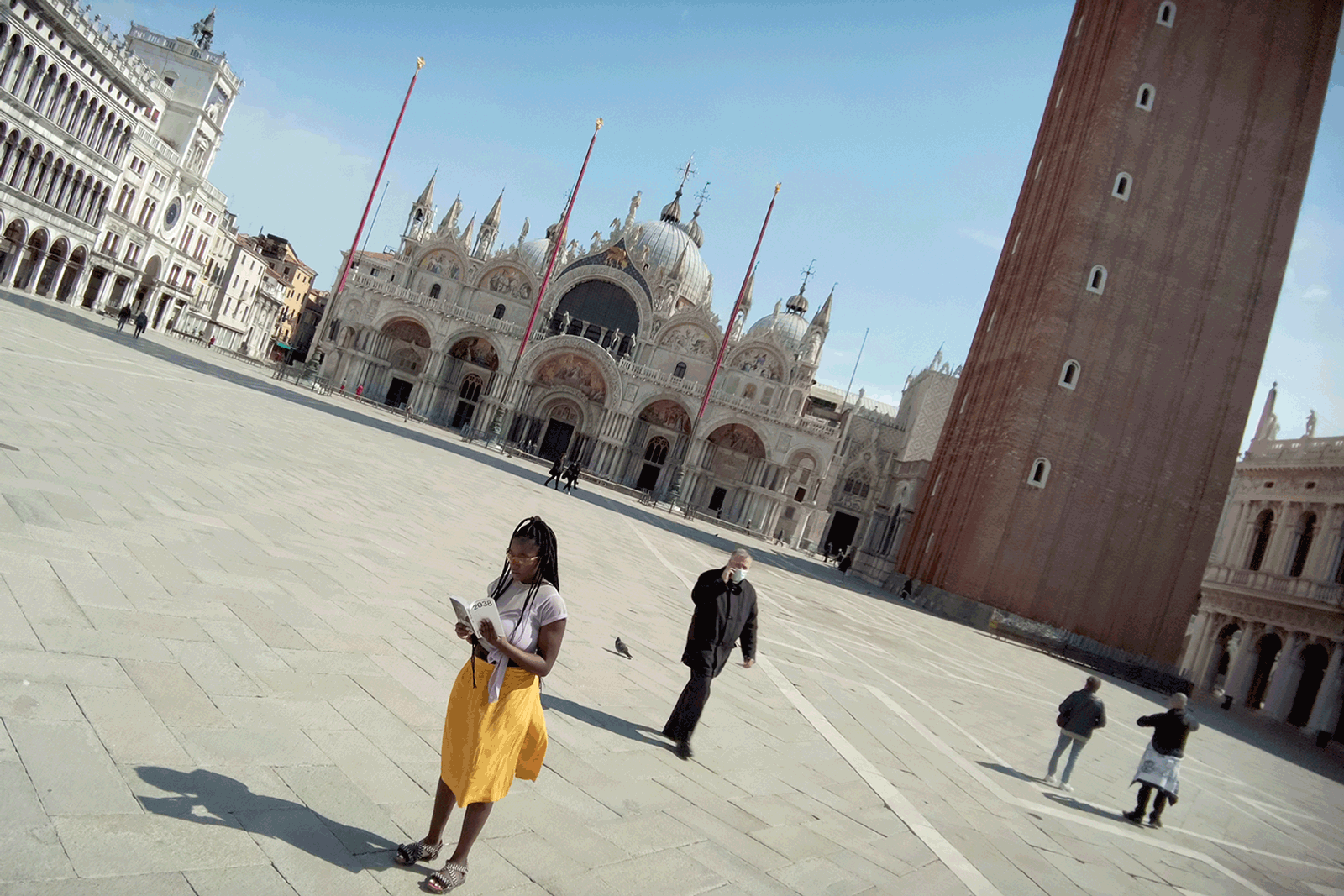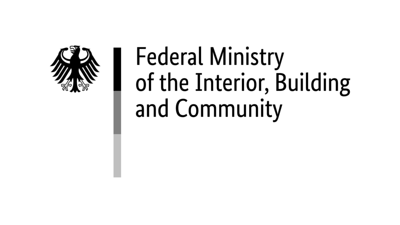May 22–November 21, 2021
The story
Today, in the year 2038, we have mastered the great crises. It was close, but we made it. The ecological, social and economic disasters of the 2020s brought people, states, institutions and companies together. They committed themselves to fundamental rights and co-created viable, adaptable systems and legal frameworks on a global basis, giving decentralized, local structures the space to maintain and create diverse models of coexisting.
Technology and big data helped turn new and old ideas into reality. And often architects were part of the dénouements because they brought answers instead of further questions. Drama is now history. We live in a radical democracy, in a radical bureaucracy. On a planet that doesn’t know or need heroes or villains.
The curatorial concept
2038, the German Pavilion at the 17th Venice Architecture Biennale, invites you to discover a story between fact and fiction. In a series of films, 2038 tells the story of a better world in which everything, though imperfect, is better in some pretty profound and radical ways. The story is based on the knowledge and visions of a collaborative team of international experts from architecture, art, ecology, economy, philosophy, politics, science, and technology. Together, team 2038 strives to explore our future society through prefigurative politics, illustrating modes of organization and social relationships to come.
The films
INTERRAIL 2038 features two young adults from the future who meet to explore the Venice of their childhood. Their encounter gives us a glimpse into how the future feels: the world has changed. Peace reigns in dimmed prosperity and personal technology helps us to better cope with complexity.
How did we create this viable system of living together? In the HISTORY CHANNELS, experts and exemplary projects trace the paths of (hi)story through the 2020s and 2030s, answering the central question of this year’s Biennale: “How will we live together?” Four key areas of transformation are identified.
Architecting data spaces
Digital spheres and data sovereignty played a crucial role in mediating our co-existence on the planet. Various docietal models were conceived and merged, resulting in a viable global system that promotes local, decentralized ways of living that still strive from collaboration and connectivity across the globla whole.
Architecting property
Property concerns, considering ownership of both land and living space, as well as of data, have been at the heart of challenging debates around inclusion and accessibility. The question of property was crucial to the question of how we want to live together.
Architecting (eco)systems
Two myths of the modern era were finally exposed: first, humans became aware of the finite nature of our ecosystems and the scarcity of resources, and thereafter, they realized that exponential growth was no longer an option. In 2038 we see the convergence and concurrence of economy and ecology in one cycle.
Architecting complexity
Architects became aware of the fact that they build not only in space but also in time (configurations). Instead of solely thinking about the practicalities of what will happen next, architects are concious of the consequences of their actions. As a whole, they reflect on how new results are generated and fed back into the system.
Architecting is an optimistic form of action, dealing with the ramifications of the built environment and its effects on all sorts of possible futures. In 2038, architecture is an active process that does not end with construction, but takes into account all life cycles, systemically and holistically. Architecture remains as relevant as ever.
The team
2038 is an international team of architects, artists, ecologists, economists, scientists, politicians and writers, initiated in 2019 by Arno Brandlhuber, Olaf Grawert, Nikolaus Hirsch and Christopher Roth, aiming to tell a (hi)story that today we call the future:
with Leo Altaras, Blaise Agüera y Arcas, Diana Alvarez-Marin, Andrés Arauz, Arts of the Working Class (Alina Kolar, Maria Ines Plaza Lazo, Paul Sochacki), Mara Balestrini, Sandra Bartoli, Diann Bauer, Jan Bauer, BBSR, Tatiana Bilbao, Lara Verena Bellenghi, BMI, Oana Bogdan, Erik Bordeleau, Mohamed Bourouissa, Jakob Brandtberg Knudsen & Lorenz von Seidlein, Francesca Bria, Loren Britton, Agnieszka Brzezanska, Vera Bühlmann, Bureau N (Inga Krumme, Katharina Neumann, Silke Neumann, Caroline Wolf), Benjamin Burq, Marina Castillo Deball, Vint Cerf, CFK Architetti (Martin Weigert), Cinema Key (Marco Fantacuzzi), Kristof Croes, Joana de la Fontaine, Elke Doppelbauer, Keller Easterling, Tobia de Eccher, Ludwig Engel, Joao Enxuto & Erica Love, ExRotaprint (Daniela Brahm and Les Schliesser), Manuel Falkenhahn, Jan Fermon, Cosimo Flohr, Foreign Legion (Matylda Krzykowski and Vera Sacchetti), Yona Friedman, Renée Gailhoustet, Jan-Peter Gieseking, Goethe-Institut, Google Arts & Culture (Klaus Teuschler), Avital Greenshopn, Dorothee Hahn, Helene Hegemann, Holger Heissmeyer, Angelika Hinterbrandner, Fabrizio Hochschild Drummond, Ludger Hovestadt, Pan Hu, Jennifer Jacquet & Becca Franks, Jonas Janke, Mitchell Joachim, JUNG, Sonja Junkers, Roberta Jurčić, Claudia Kessler, Goda Klumbyte, Gábor Kocsis, Ferdinand Knecht, Sénamé Koffi Agbodjinou, Ulrich Kriese, Philipp Krüpe, Lukas Kubina, Nikolaus Kuhnert, Phyllis Lambert, Samira Lenzin, Lawrence Lessig, Cédric Libert, Ferdinand Ludwig & Daniel Schoenle, Suhail Malik, Charlotte Malterre-Barthes, Renzo Martens, Hilary Mason, V. Mitch McEwen, James Meadway, Roman Miletitch, Omoju Miller, Evgeny Morozov, MOTIF (Kathrin Fritsch, Helene von Schwichow, Diana Kozachek), Motor Productions (Severin Bärenbold), Caroline Nevejan, Bahar Noorizadeh, Sabine Oberhuber & Thomas Rau, Jorge Orozco, Verena Otto, Shwetal Patel, Wong Ping, POLIGONAL (Christian Haid, Lukas Staudinger), Joanna Pope, Christian Posthofen, Alessandra Quattrini, Leif Randt, RAUE Partnerschaft von Rechtsanwälten und Rechtsanwältinnen, Rebiennale (Giulio Grillo), Kim Stanley Robinson, Denis “Jaromil” Roio, Raquel Rolnik, Meghan Rolvien, Juliana Rotich, Belle Santos, S.a.L.E. Docks, Saygel Schreiber & Gioberti (Attila Saygel), Clemens Schick, Ivo Semenitsch, Patrik Schumacher, Jack Self, Max Senges, Deane Simpson, space-time.tv (Carl Berthold, Holger Friese, Max Kossatz), Jonas Staal, Bruce Sterling, Michael Stöppler, Lia Strenge, Audrey Tang, Tecnoservice (Pierro Zennaro), terra0 (Max Hampshire, Paul Kolling, Paul Seidler), The Laboratory of Manuel Bürger (Manuel Bürger, Simon Schindele), Cassie Thornton, Jeanne Tremsal, Galaad Van Daele, Iris van der Tuin, Marcus Vesterager, Vitra, Julian Wäckerlin, Eyal Weizman, Julia Werlen, E. Glen Weyl, WHY Ventures (Floris Dreesman, Marie-Charlotte Schmidt), Mark Wigley, Anna Yeboah, Vanessa Yeboah, Erez Yoeli, Marco Zambrano, Tirdad Zolghadr.



